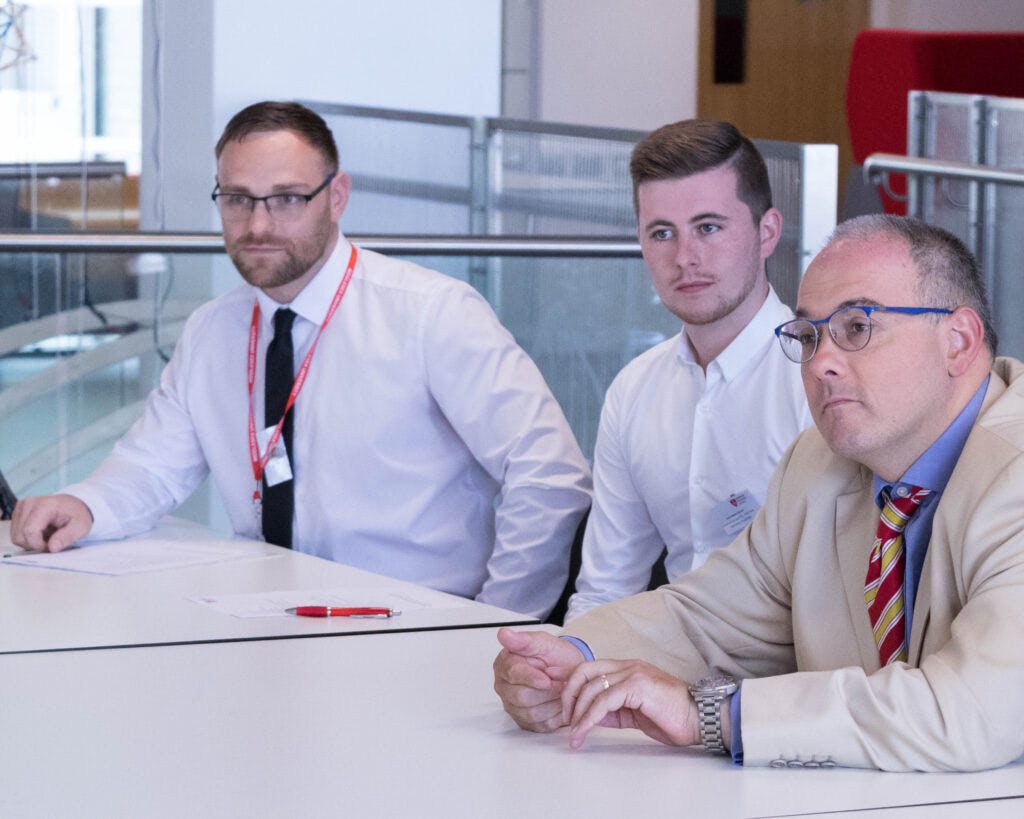Partnerships between HE and FE essential to tackling skills shortages and social mobility, say @MiddlesexUni and Capital City College Group

Leaders from Middlesex University London and London’s Capital City College Group (CCCG) called for barriers to lifelong learning to be removed, and for the education system to offer learners greater flexibility to move between different types of learning at different times in their lives.
The calls came as Middlesex University and CCCG have entered into a new strategic partnership to plug the growing skills gap in London, and to create opportunities for students to participate in higher education by offering seamless learning pathways for people of all abilities, ages, and needs.
The partners hosted a visit from the Rt Hon Robert Halfon, MP for Harlow and Chair of the Education Select Committee, and Dr Matthew Offord, MP for Hendon, to see the partnership in action.
Professor Tim Blackman, Vice-Chancellor, Middlesex University London said: “Currently, policymakers categorise the post-18 education system into academic and technical routes which suggests learners should choose one route or another – often at a young age- when in reality there is considerable overlap. This does not reflect the reality of many people’s learning journeys nor the reality of the emerging jobs and skills landscape.
“At Middlesex, we work closely with schools, FE institutions and employers and deliver practice-led advanced technical education. Through our partnership with CCCG we will work to make lifelong learning as obstacle-free as we can for the 40,000 learners we reach, for example by aligning our apprenticeship programmes in digital technology, the biosciences and food and nutrition, to create pathways to higher level learning and plug skills gaps.”
Andy Wilson from CCCG said: “Many of our students have overcome significant barriers to enter further education and we’re delighted to be able to work with Middlesex University to guide students through the various learning pathways on offer to be able to continue with their studies into higher education and fulfil their potential.
“Social mobility happens incrementally and partnerships such as this are crucial to raising aspirations and attainment, and responding to future skills needs.”
Robert Halfon said: “It is encouraging to see Middlesex University and Capital City College Group are collaborating to help learners navigate their learning journey, and creating ladders of opportunity for learners to support social justice.
“Both further and higher education have an important role to play in delivering high quality technical education, and partnerships such as this are an effective way to respond to new challenges and have the potential to transform even more lives.”
Matthew Offord said: “The Middlesex University/CCCG partnership has the potential to make a real difference for learners in Hendon, plugging the skills gap and supporting people to access education throughout their lives.”
With the Government review of post-18 education and funding underway, Middlesex University London and CCCG believe a system of credits and levels – using a competency-based framework – would give the system the flexibility it desperately needs to respond to ever-changing skills needs, and to have a real impact on social mobility in the UK.
The partnership also believes that apprenticeships are an essential, alternative learning pathway that could have a significant impact on social mobility. They are calling on the Institute for Apprenticeships (IFA) to collaborate more effectively with further and higher education to iron out issues over degree apprenticeship funding levels, approval of new standards, and retention of the degree qualification on completion of the apprenticeship.
For more information about the crucial role HE and FE partnerships can play in driving social mobility and skills, please see Middlesex University’s recent submission to the House of Commons Education Select Committee Inquiry into the Fourth Industrial Revolution.
About Middlesex University London: For nearly 140 years Middlesex University London has been home to innovators and change-makers. We are a progressive London university that puts our students first and provides expert teaching informed by inspiring research and practice.
We boast a diverse, multinational and multicultural community of 19,400 students from 144 different countries based at our modern north London campus. We also have campuses in Dubai, Mauritius and Malta, bringing our total number of students to almost 37,000 and staff over 1,900. Middlesex University London generates more than £300 million a year for the Barnet economy, supporting some 4,000 local jobs.
A university for skills, we work with employers to make sure that what our students learn is what employers need, and we strive to transform the lives of our students so that they have an excellent experience while they are with us, and a solid foundation for inspiring careers when they leave us.
About Capital City College Group: The Capital City College Group (CCCG) is London’s largest further education and training provider, with around 37,000 students and an annual income totalling £110m.
The Group comprises three further education colleges: City and Islington College, The College of Haringey, Enfield and North East London (CONEL) and Westminster Kingsway College, as well as a specialist training arm – Capital City College Training (CCCT) which provides workforce development support and around 100 apprenticeship programmes to organisations located in London.
CCCG has 11 college sites across central and north London for 16-18 year olds, adult learners, apprentices and businesses. It has nationally-recognised specialisms in areas such as construction, digital technology, healthcare, hospitality, rail engineering and science.

Responses